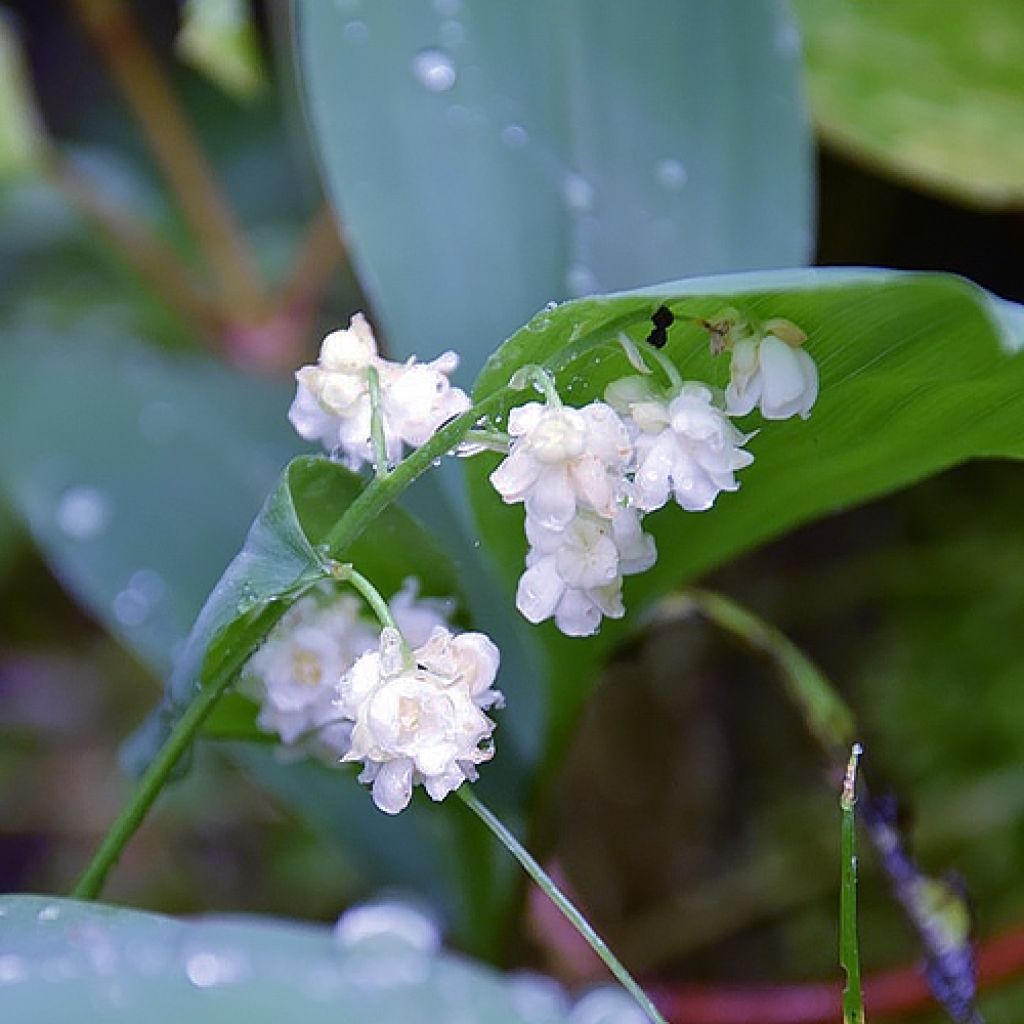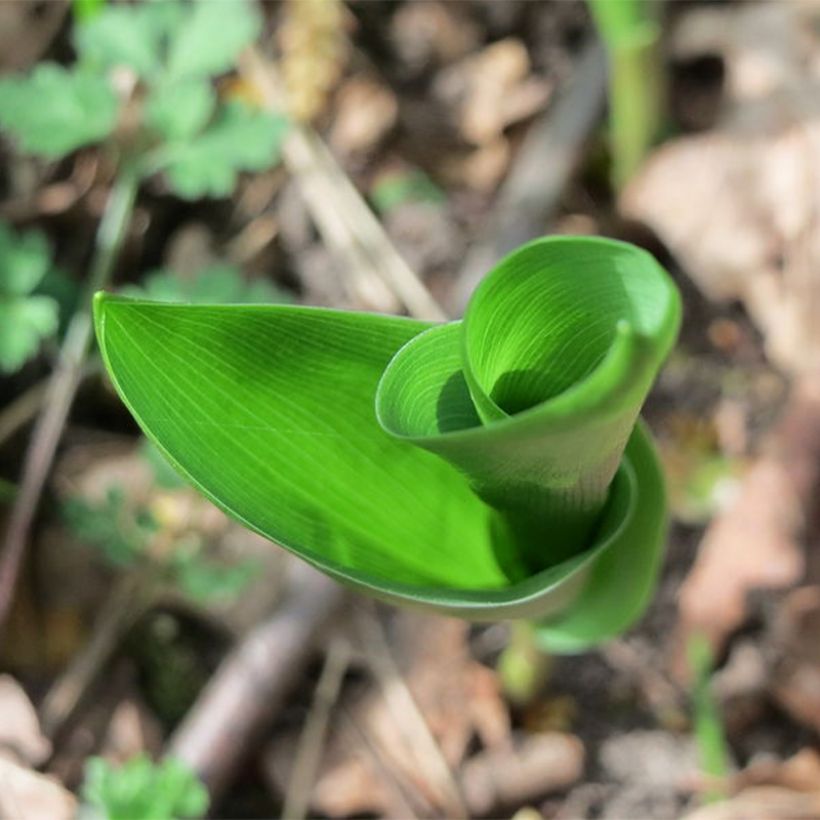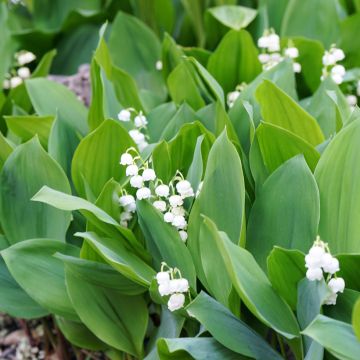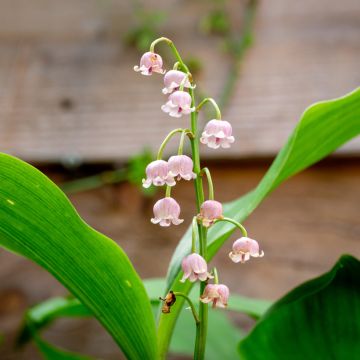

Convallaria Flore Pleno - Muguet à fleurs doubles
Convallaria majalis Flora Pleno - Lily of the Valley
Convallaria majalis Flore Pleno
Lily of the Valley
Why not try an alternative variety in stock?
View all →This plant carries a 6 months recovery warranty
More information
We guarantee the quality of our plants for a full growing cycle, and will replace at our expense any plant that fails to recover under normal climatic and planting conditions.
From €5.90 for pickup delivery and €6.90 for home delivery
Express home delivery from €8.90.
Does this plant fit my garden?
Set up your Plantfit profile →
Description
The Convallaria majalis 'Flore Pleno' is a type of florist's Lily of the Valley with fragrant white flowers and double petals. This charming variety blooms at the same time as wild Lily of the Valley in May. Although it grows more slowly, it is an excellent addition to gardens and bouquets as it is easy to cultivate and creates a beautiful ground cover under trees.
The Convallaria majalis Flore Pleno, also known as the Lily of the Valley or May Lily, is a plant that belongs to the Convallariaceae or Liliaceae family, depending on its classification. It is native to cool temperate regions of the Northern Hemisphere, such as Europe, Asia, and North America. The Florist's Lily of the Valley is a hardy plant and is easy to grow, making it popular among gardeners. It can grow in sunny and shady areas but prefers light soil and cool temperatures to bloom and spread abundantly.
The 'Flore Pleno' Lily of the Valley is a perennial plant that grows up to 12-15 cm (5-6in) in height. It has a rhizomatous shrub that forms fleshy claws and eventually covers the soil like a carpet. The above-ground vegetation emerges from the ground in spring and disappears in autumn, or sometimes during summer if it is dry. This variety develops large sheathing leaves at the base, which are lanceolate to elongate-ovate in shape, ending in a point. The leaves are dark green and measure 10 to 12 cm (4 to 5in) in length, and their lamina has numerous parallel veins, making them easy to identify.The plant usually flowers in early May, depending on the climate. Lily of the Valley is a plant with small, white, bell-shaped flowers that emit a pleasant scent. The flowers grow in clusters of three to five and hang from branches that are about 15-20 cm (6-8in) tall. The plant is toxic, so it is important to be cautious when handling it.
Plant the Flore Pleno Lily of the Valley somewhere prominent, along a shaded alley, on the patio, on the edge of undergrowth, near a walkway or in a large pot to enjoy its fragrance. Pair it with periwinkles, wood hyacinths, liriopes, perennial bleeding hearts, blue forget-me-nots, or ophiopogons.
Report an error about the product description
Convallaria majalis Flora Pleno - Lily of the Valley in pictures


Plant habit
Flowering
Foliage
Botanical data
Convallaria
majalis
Flore Pleno
Convallariaceae
Lily of the Valley
Central Europe
Other Convallaria - Lily of the valley
Planting and care
To grow the Convallaria Majalis Flore Pleno, choose a light, humus-rich soil that stays slightly moist in summer. You can plant it in a pot or at the edge of a shaded bed. This perennial plant can withstand root competition from trees and bushes and is also resistant to heavy frost. Remember that this plant is highly toxic, so handle it carefully. There are no known enemies or parasites that affect this plant.
Planting period
Intended location
Care
This item has not been reviewed yet - be the first to leave a review about it.
Haven't found what you were looking for?
Hardiness is the lowest winter temperature a plant can endure without suffering serious damage or even dying. However, hardiness is affected by location (a sheltered area, such as a patio), protection (winter cover) and soil type (hardiness is improved by well-drained soil).

Photo Sharing Terms & Conditions
In order to encourage gardeners to interact and share their experiences, Promesse de fleurs offers various media enabling content to be uploaded onto its Site - in particular via the ‘Photo sharing’ module.
The User agrees to refrain from:
- Posting any content that is illegal, prejudicial, insulting, racist, inciteful to hatred, revisionist, contrary to public decency, that infringes on privacy or on the privacy rights of third parties, in particular the publicity rights of persons and goods, intellectual property rights, or the right to privacy.
- Submitting content on behalf of a third party;
- Impersonate the identity of a third party and/or publish any personal information about a third party;
In general, the User undertakes to refrain from any unethical behaviour.
All Content (in particular text, comments, files, images, photos, videos, creative works, etc.), which may be subject to property or intellectual property rights, image or other private rights, shall remain the property of the User, subject to the limited rights granted by the terms of the licence granted by Promesse de fleurs as stated below. Users are at liberty to publish or not to publish such Content on the Site, notably via the ‘Photo Sharing’ facility, and accept that this Content shall be made public and freely accessible, notably on the Internet.
Users further acknowledge, undertake to have ,and guarantee that they hold all necessary rights and permissions to publish such material on the Site, in particular with regard to the legislation in force pertaining to any privacy, property, intellectual property, image, or contractual rights, or rights of any other nature. By publishing such Content on the Site, Users acknowledge accepting full liability as publishers of the Content within the meaning of the law, and grant Promesse de fleurs, free of charge, an inclusive, worldwide licence for the said Content for the entire duration of its publication, including all reproduction, representation, up/downloading, displaying, performing, transmission, and storage rights.
Users also grant permission for their name to be linked to the Content and accept that this link may not always be made available.
By engaging in posting material, Users consent to their Content becoming automatically accessible on the Internet, in particular on other sites and/or blogs and/or web pages of the Promesse de fleurs site, including in particular social pages and the Promesse de fleurs catalogue.
Users may secure the removal of entrusted content free of charge by issuing a simple request via our contact form.
The flowering period indicated on our website applies to countries and regions located in USDA zone 8 (France, the United Kingdom, Ireland, the Netherlands, etc.)
It will vary according to where you live:
- In zones 9 to 10 (Italy, Spain, Greece, etc.), flowering will occur about 2 to 4 weeks earlier.
- In zones 6 to 7 (Germany, Poland, Slovenia, and lower mountainous regions), flowering will be delayed by 2 to 3 weeks.
- In zone 5 (Central Europe, Scandinavia), blooming will be delayed by 3 to 5 weeks.
In temperate climates, pruning of spring-flowering shrubs (forsythia, spireas, etc.) should be done just after flowering.
Pruning of summer-flowering shrubs (Indian Lilac, Perovskia, etc.) can be done in winter or spring.
In cold regions as well as with frost-sensitive plants, avoid pruning too early when severe frosts may still occur.
The planting period indicated on our website applies to countries and regions located in USDA zone 8 (France, United Kingdom, Ireland, Netherlands).
It will vary according to where you live:
- In Mediterranean zones (Marseille, Madrid, Milan, etc.), autumn and winter are the best planting periods.
- In continental zones (Strasbourg, Munich, Vienna, etc.), delay planting by 2 to 3 weeks in spring and bring it forward by 2 to 4 weeks in autumn.
- In mountainous regions (the Alps, Pyrenees, Carpathians, etc.), it is best to plant in late spring (May-June) or late summer (August-September).
The harvesting period indicated on our website applies to countries and regions in USDA zone 8 (France, England, Ireland, the Netherlands).
In colder areas (Scandinavia, Poland, Austria...) fruit and vegetable harvests are likely to be delayed by 3-4 weeks.
In warmer areas (Italy, Spain, Greece, etc.), harvesting will probably take place earlier, depending on weather conditions.
The sowing periods indicated on our website apply to countries and regions within USDA Zone 8 (France, UK, Ireland, Netherlands).
In colder areas (Scandinavia, Poland, Austria...), delay any outdoor sowing by 3-4 weeks, or sow under glass.
In warmer climes (Italy, Spain, Greece, etc.), bring outdoor sowing forward by a few weeks.







































